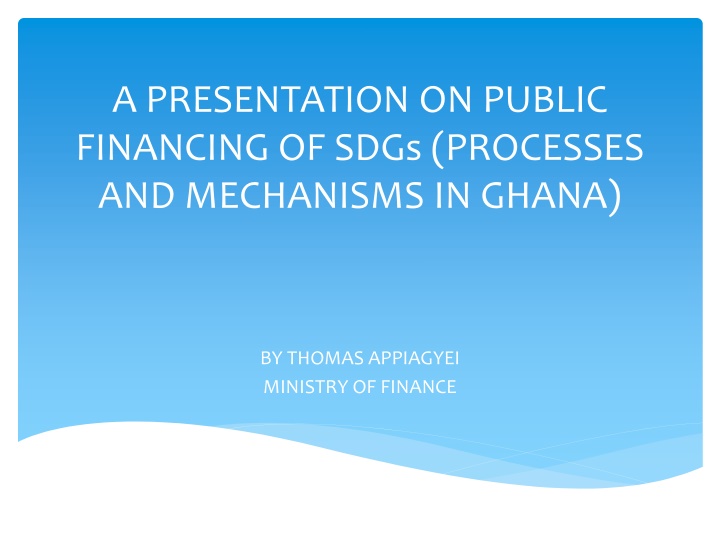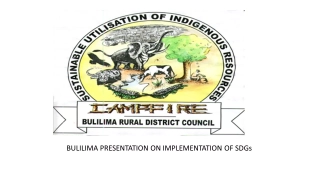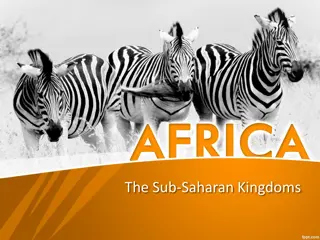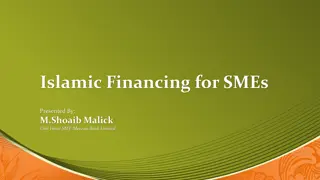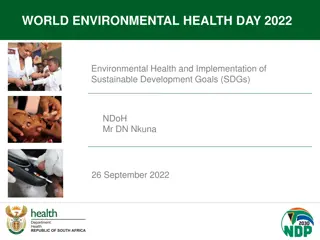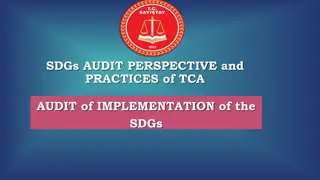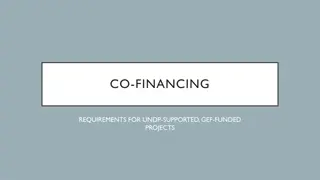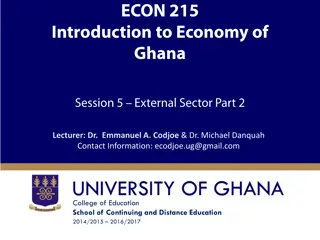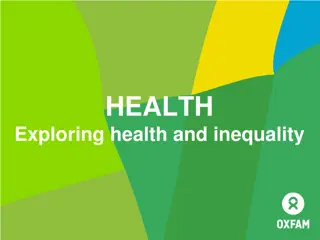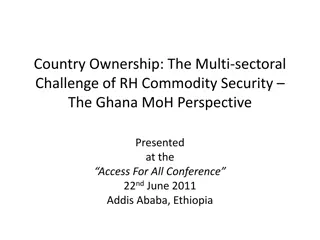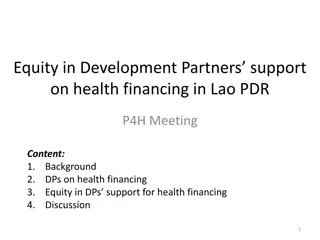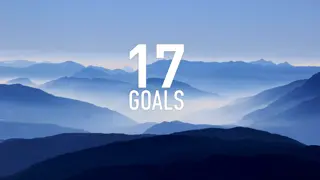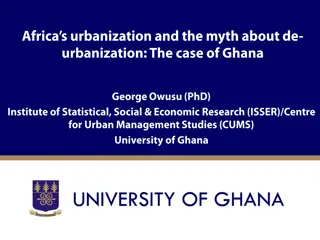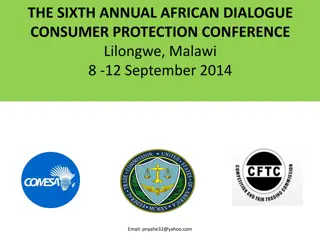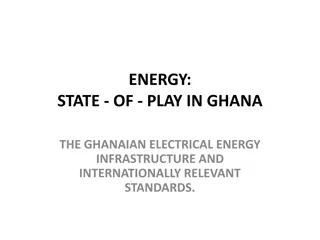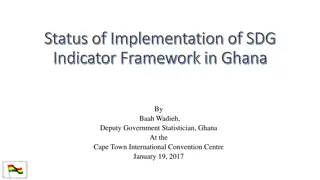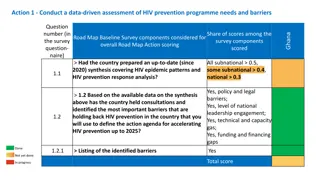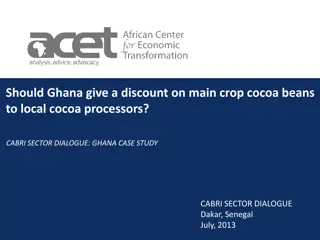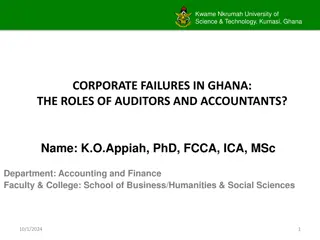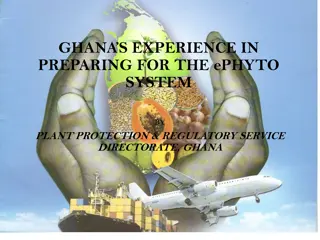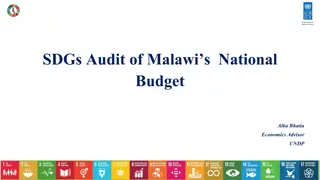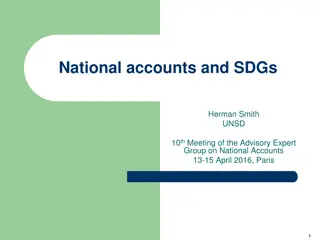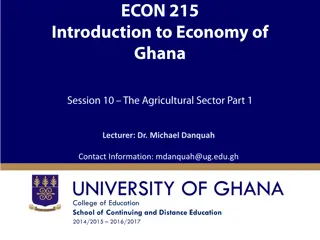Public Financing of SDGs in Ghana: Processes and Mechanisms
This presentation by Thomas Appiagyei from the Ministry of Finance delves into the public financing of Sustainable Development Goals (SDGs) in Ghana. It explores the various processes and mechanisms in place to support the funding of SDGs within the country, providing valuable insights for stakeholders and policymakers involved in financial planning for sustainable development.
Uploaded on Mar 07, 2025 | 0 Views
Download Presentation

Please find below an Image/Link to download the presentation.
The content on the website is provided AS IS for your information and personal use only. It may not be sold, licensed, or shared on other websites without obtaining consent from the author.If you encounter any issues during the download, it is possible that the publisher has removed the file from their server.
You are allowed to download the files provided on this website for personal or commercial use, subject to the condition that they are used lawfully. All files are the property of their respective owners.
The content on the website is provided AS IS for your information and personal use only. It may not be sold, licensed, or shared on other websites without obtaining consent from the author.
E N D
Presentation Transcript
A PRESENTATION ON PUBLIC FINANCING OF SDGs (PROCESSES AND MECHANISMS IN GHANA) BY THOMAS APPIAGYEI MINISTRY OF FINANCE
OUTLINE OF PRESENTATION Introduction Sustainable Development Goals The need for government intervention Budget Processes Public Financing (Finance) Financing Mechanism Implications of Ghana s Lower Middle Income Status Public Financed Water and Sanitation Projects Provision of Clean Water and Sanitation The Role of other Stakeholders Conclusion 26TH EDITION OF MOLE CONFERENCE 2 3/7/2025
Introduction Some fifteen years ago the United Nations (UN) MDGs were agreed upon and these have been guiding global development policy since the year 2000 and are expected to end by December 2015. Progress has been uneven across the world including Ghana. One of the challenges accounting for the uneven progress across the world was inadequate finance. With the end of 2015 in sight, some of the MGDs remain off-track, necessitating the need for new post-2015 framework which culminated in SDGs. 26TH EDITION OF MOLE CONFERENCE 3 3/7/2025
SUSTAINABLE DEVELOMENT GOALS 1. 2. 3. NO POVERTY ZERO HUNGER GOOD HEALTH AND WELL BEING QUALITY EDUCATION GENDER EQUALITY CLEAN WATER AND SANITATION AFFORDABLE AND CLEAN ENERGY DECENT WORK AND ECONOMIC GROWTH INDUSTRY, INNOVATION AND INFRASTRUCTURE 10. REDUCED INEQUALITY 11. SUSTAINABLE CITIES AND COMMUNITIES 12. RESPONSIBLE CONSUMPTION AND PRODUCTION 13. CLIMATE ACTION 14. LIFE BELOW WATER 15. LIFE ON LAND 16. PEACE JUSTUCE STRONG INSTITUTIONS 17. PARTNERSHIPS FOR THE GOALS 4. 5. 6. 7. 8. 9. 26TH EDITION OF MOLE CONFERENCE 4 3/7/2025
THE NEED FOR GOVERNMENT INTERVENTION Each day, nearly 1,000 children die due to preventable water and sanitation-related diarrhoeal diseases; increase safety of people especially women and girls; At least 1.8 billion people globally use a source of drinking water that is fecally contaminated; Water is essential for local development, particularly for sectors such as health, agriculture, economic development, education water scarcity affects more than 40 per cent of the global population and is projected to rise Ensuring access to safe and affordable drinking water requires investment in infrastructure. 26TH EDITION OF MOLE CONFERENCE 5 3/7/2025
BUDGET PROCESSES National Development Policy Framework for the period; Strategic Plans of MDAs for the period with implementable Annual Action Plans; Policy hearings; Issuance of Budget Guidelines with allocations or ceilings; MDAs prepare and submit proposed budget; Technical hearings; Final Allocations communicated to MDAs; MDAs finalize budget; Presentation of Budget Statement and Economic Policy of Government to Parliament; 26TH EDITION OF MOLE CONFERENCE 6 3/7/2025
BUDGET PROCESSES Select Committees of Parliament conduct hearing with MDAs; Reports by Select Committees are approved by Parliament; Appropriation Bill is passed and accented to by the President. 26TH EDITION OF MOLE CONFERENCE 7 3/7/2025
PUBLIC FINANCING Public Financing is the act of providing funds for the business of government at all levels national, regional and district with the desire of providing certain services. It deals with the finances of public bodies national, regional or districts for the performance of their functions with funds drawn from the Consolidated Fund other than from private sources. It is made up of funds from Government of Ghana (GoG), Internally Generated Fund (IGF) and Development Partner Fund (DPF). Funds for the performance of functions are expended from the approved national budget. Its use is governed by rules and regulations developed and approved by the state. E.g. Public Procurement Act, FAR, FAA and Internal Audit Agency Act. The accounts are subject to audit 26TH EDITION OF MOLE CONFERENCE 8 3/7/2025
FINANCING MECHANISMS Government of Ghana source; - Budget rigidities the 1992 Constitution and Acts of Parliament - Expenditure on COE (Wages and salaries) - Interest payment and amortization - Drastic fall in the price of oil Grants; - Influx of immigrants (desperate journeys) in some EU countries - tied to specific. MAF under EU - Non disbursement of grants Loans; - increasing debt Public Private Partnership; Charging at commercial rates to attract private operators 26TH EDITION OF MOLE CONFERENCE 9 3/7/2025
Implications of Ghanas Lower Middle Income Status LMIC $1,006 $3,975. Ghana s per capita income $1,570 Loss of access to highly concessional loans (long grace periods and extremely low interest rate) from International Development Association (IDA) of the World Bank & AfDB; Loss of IDA funds; Reduction in MDBS support which so far contributed over $2b to the country s budget; and Exit or Graduation Plans underway for the country to bear full cost. E.g. GAVI, Global Fund. 26TH EDITION OF MOLE CONFERENCE 10 3/7/2025
PUBLIC FINANCED WATER AND SANITATION PROJECTS YEAR RURAL WATER URBAN WATER SMALL TOWN WATER & SANITATION 670 Boreholes 20 Hand-dug wells Asante Akim South Afigya Kwabre CWSA constructed: 2,541 VIP latrines 72 KVIPs 232 Institutional latrines 7,194 household latrines 618 mechanised boreholes 36 rain water harvesting schemes 2011 26TH EDITION OF MOLE CONFERENCE 11 3/7/2025
PUBLIC FINANCED WATER AND SANITATION PROJECTS YEAR RURAL WATER PERI-URBAN WATER 550 boreholes, drilled and fitted with hand pumps; 15 Small town piped system SMALL TOWN WATER SUPPLIES SYSTEMS Bole Bimbilla Chereponi Daboya Gambage Walewale Salaga Gushiegu Nalerigu Saboba Tinga Wulensi Zabzugu 2012 26TH EDITION OF MOLE CONFERENCE 12 3/7/2025
PUBLIC FINANCED WATER AND SANITATION PROJECTS YEAR RURAL WATER URBAN WATER SMALL TOWN WATER & SANITATION 2013 Barekese Kpong Essakyir Mampong Wa Suhum Osenase Kibi Anyinam Apedwa Kwabeng Sustainable Rural Water & Sanitation 600,000 people in 66 districts in Upper West, Upper East, Northern, Brong Ahafo, Central and Western Regions. 26TH EDITION OF MOLE CONFERENCE 13 3/7/2025
PUBLIC FINANCED WATER AND SANITATION PROJECTS YEAR RURAL WATER URBAN WATER SMALL TOWN WATER & SANITATION 2014 Accra Teme Metropolitan Area (ATMA) Rural Water Supply Reh. & Exp Proj. 782 boreholes drilled in five regions including the three northern regions Kpong Water Supply Expansion Under Northern Reg. Small Towns Water & Sanitation Project (NORST), projects completed included Bunkpurugu -1, Karaga -1, Yendi-2, Nanumba North- 1, Binkera, Tanga, Makayili and Tatali 26TH EDITION OF MOLE CONFERENCE 14 3/7/2025
PROVISION OF CLEAN WATER & SANITATION THE ROLE OF OTHER STAKEHOLDERS Community Contributing to provide borehole Tree planting along river banks Doing the thing right Provision of public place of convenience Individual Rain harvesting Construction of water tanks Provision of latrines in houses 26TH EDITION OF MOLE CONFERENCE 15 3/7/2025
PROVISION OF CLEAN WATER & SANITATION THE ROLE OF OTHER STAKEHOLDERS NGOs/CSOs Advocacy Monitoring of water and sanitation projects to ensure value for money Awareness creation The need to maintain clean environment The need to protect water bodies 26TH EDITION OF MOLE CONFERENCE 16 3/7/2025
PROVISION OF CLEAN WATER & SANITATION THE ROLE OF OTHER STAKEHOLDERS Development Partners - Transfer of financial resources and expertise; - local capacity building - support developing countries with water efficiency and treatment technologies 26TH EDITION OF MOLE CONFERENCE 17 3/7/2025
CONCLUSION Concerted effort is needed to ensure clean water and sanitation for now and generations to come. 26TH EDITION OF MOLE CONFERENCE 18 3/7/2025
THANKS FOR YOUR ATTENTION 26TH EDITION OF MOLE CONFERENCE 19 3/7/2025
